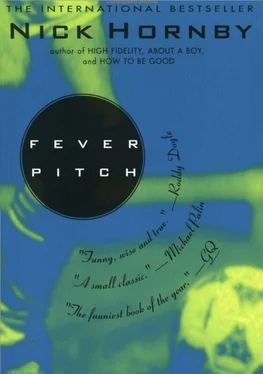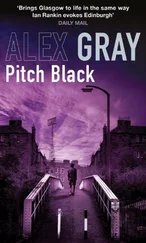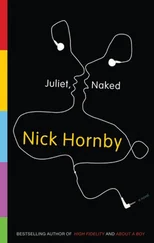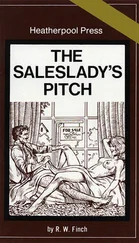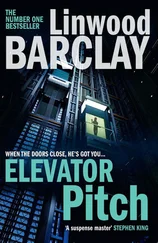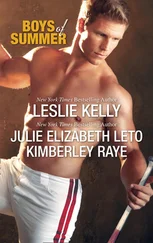The gift I got that afternoon was priceless, like world peace or an end to Third World poverty, something that couldn’t be bought for a million pounds—unless my dad had bought the referee at Leeds for a million pounds, the only possible explanation for some of his decisions that afternoon. One of West Brom’s goals was by general consensus hundreds of yards offside, provoking the crowd into invading the pitch, which in turn resulted in Leeds being banned from their ground for the first few games of the following season. “The crowd has gone mad and they have every right to do so,” Barry Davies pronounced memorably on Match of the Day that night; those were the days, when TV commentators actively encouraged riots rather than argued pompously for the return of National Service. If you did slip the ref something, then thanks, Dad. Brilliant idea. Would Leeds have lost at home to West Brom if it hadn’t been my birthday? Would the game at Arsenal have finished nil-nil, as Arsenal v Newcastle games had always done before? Would we then have gone on to win the League? I doubt it.
CHELSEA v TOTTENHAM
January 1972
It is true to say that while I made a natural Arsenal supporter—I too was often dour, defensive, argumentative, repressed—my father belonged at Stamford Bridge. Chelsea were flamboyant, unpredictable and, it has to be said, not the most reliable of teams; my father had a taste for pink shirts and theatrical ties, and, stern moralist that I was, I think I felt that he could have done with a little more consistency. (Parenthood, George Graham would say, is a marathon, not a sprint.) Whatever the reason, Dad patently enjoyed going to Chelsea more than our trips to Highbury, and it was easy to see why. We once spotted Tommy Steele (or maybe it was John Alderton) coming out of the Gents in Chelsea’s North Stand, and before the games we ate in one of the Italian restaurants on the King’s Road. Once we went to look around the Chelsea Drugstore, where I bought the second Led Zeppelin album and sniffed the cigarette smoke in the air suspiciously. (I was as literal-minded as any Arsenal centre-half.)
Chelsea had Osgood and Cooke and Hudson, all flash and flair, and their version of football was bewilderingly different from Arsenal’s (this League Cup semi-final, one of the best games I had ever seen, finished 2-2). But more importantly, the Bridge and its environs presented me with a different but still familiar version of London: familiar because the middle-class suburban boy has always been aware of it. It was not dissimilar to the London we already knew from trips to see pantomimes and films and museums, a busy, bright-lights-big-city London supremely aware that it was the centre of the world; and the people that I saw at Chelsea in those days were centre-of-the-world people. Football was a fashionable game, and Chelsea were a fashionable team; the models and actors and young executives who were cheering the Blues on were beautiful to look at and made the Bridge (the seats, anyway) an exquisitely exotic place.
But this wasn’t what I came to football for. Arsenal and its neighbourhood was for me much more exotic than anything I would ever see around the King’s Road, which was full of an old-hat ho-hum glitz; football had gripped me because of its otherness . All those quiet terraced streets around Highbury and Finsbury Park, all those embittered but still peculiarly loyal used-car salesmen … now that was real exoticism; the London that a grammar school boy from the Thames Valley could never have seen for himself no matter how many times he went to the Casino cinema to see films in Cinerama. We wanted different things, my dad and I. Just as he was starting to want a part of what Chelsea was all about (and just as he was, for the first time in his life, able to afford it), I wanted to go tearing off in the other direction.
READING v ARSENAL
5.2.72
The white south of England middle-class Englishman and woman is the most rootless creature on earth; we would rather belong to any other community in the world. Yorkshiremen, Lancastrians, Scots, the Irish, blacks, the rich, the poor, even Americans and Australians have something they can sit in pubs and bars and weep about, songs to sing, things they can grab for and squeeze hard when they feel like it, but we have nothing, or at least nothing we want. Hence the phenomenon of mock-belonging, whereby pasts and backgrounds are manufactured and massaged in order to provide some kind of acceptable cultural identity. Who was it that sang “I Wanna Be Black”? The title says it all, and everybody has met people who really do: in the mid-seventies, young, intelligent and otherwise self-aware white men and women in London began to adopt a Jamaican patois that frankly didn’t suit them at all. How we all wished we came from the Chicago Projects, or the Kingston ghettos, or the mean streets of north London or Glasgow! All those aitch-dropping, vowel-mangling punk rockers with a public school education! All those Hampshire girls with grandparents in Liverpool or Brum! All those Pogues fans from Hertfordshire singing Irish rebel songs! All those Europhiles who will tell you that though their mothers live in Reigate, their sensibilities reside in Rome!
Ever since I have been old enough to understand what it means to be suburban I have wanted to come from somewhere else, preferably north London. I have already dropped as many aitches as I can—the only ones left in my diction have dug themselves too far into definite articles to be winkled out—and I use plural verb forms with singular subjects whenever possible. This was a process that began shortly after my first visits to Highbury, continued throughout my suburban grammar school career, and escalated alarmingly when I arrived at university. My sister, on the other hand, who also has problems with her suburban roots, went the other way when she went to college, and suddenly started to speak like the Duchess of Devonshire; when we introduced each other to our respective sets of friends they found the experience perplexing in the extreme. Which of us, they seemed to be wondering, had been adopted? Had she fallen on hard times or had I struck lucky? Our mother, born and bred in south-east London but a Home Counties resident for nearly forty years, cuts the accents neatly down the middle.
In a way nobody can blame any of us, the Mockneys or the cod Irish, the black wannabees or the pseudo Sloanes. The 1944 Education Act, the first Labour Government, Elvis, beatniks, the Beatles and the Stones, the sixties … we never stood a chance. I blame the eleven-plus. Before the war, maybe, our parents could have scraped the money together to send us to minor public schools, and we would have received our pisspoor cheapskate third-hand classical educations and gone to work in a bank; the eleven-plus, designed to create a meritocracy, made state schools safe for nice families again. Post-war grammar school boys and girls stepped into a void; none of the available cultures seemed to belong to us, and we had to pinch one quick. And what is suburban post-war middle-class English culture anyway? Jeffrey Archer and Evita , Flanders and Swann and the Goons, Adrian Mole and Merchant-Ivory, Francis Durbridge Presents … and John Cleese’s silly walk? It’s no wonder we all wanted to be Muddy Waters or Charlie George.
The Reading-Arsenal fourth-round Cup-tie in 1972 was the first and most painful of the many exposures to come. Reading was my nearest League team, an unhappy geographical accident that I would have done anything to change; Highbury was thirty-odd miles away, Elm Park a mere eight. Reading fans had Berkshire accents, and incredibly they didn’t seem to mind; they didn’t even try to speak like Londoners. I stood with the home supporters—the match was all-ticket, and it was much easier to go to Reading than to north London to get one—and while I waited my still customary ninety minutes for the game to begin, a whole family (a family!), mother, father and son, all kitted up in blue-and-white scarves and rosettes (rosettes!), started talking to me.
Читать дальше
